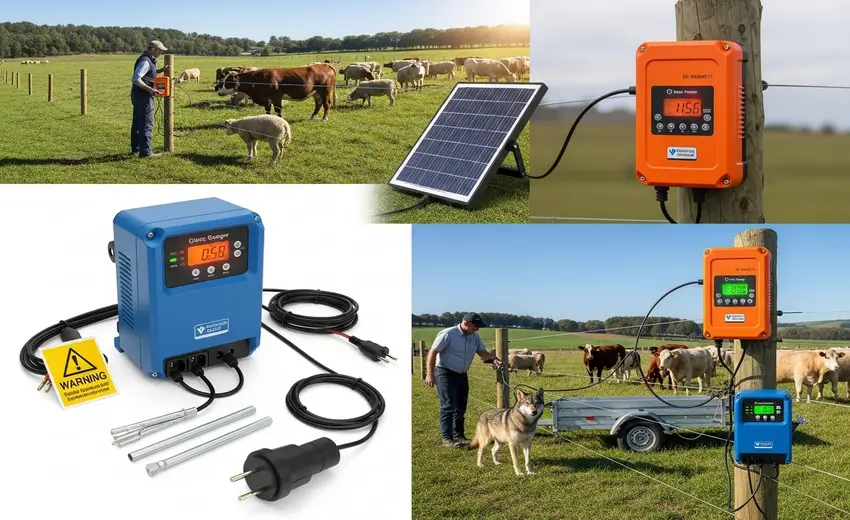
A reliable electric fence charger is indispensable for securing your farm’s livestock and deterring unwanted predators. It not only keeps your animals within a specific boundary but also helps ensure their safety. With modern technology, these chargers have become more efficient and user-friendly, providing a worry-free solution for farm owners. In this article, we will delve into all aspects necessary for creating an effective electric fence system.
Why a Proper Electric Fence Charger is Crucial
The cornerstone of your electric fence system is the electric fence charger. This device sends high-voltage pulses through the electric fence, creating a safe yet effective barrier for animals. A powerful charger ensures that adequate voltage reaches every part of the fence, even over long distances. As a result, animals experience a mild shock upon contact with the fence, deterring them from approaching it. Selecting the right charger is paramount for the safety of your livestock and property.
The Role of an Electric Fence Charger in Farm Security
An effective electric fence charger plays a vital role in the overall security of your farm. It doesn’t just contain livestock but also prevents local wildlife such as foxes, wolves, or other predators from entering your farm. A well-designed electric fence system minimizes the risk of animals escaping, thus preventing economic losses for farmers. Furthermore, it can serve as an additional deterrent against theft, protecting your valuable livestock.
Advantages of Electric Fences Over Traditional Barriers
Electric fencing offers several advantages over traditional wire or wooden fences. Firstly, it is comparatively easier and quicker to install. Secondly, its maintenance cost is lower because it relies on psychological deterrence rather than physical resistance. Once animals experience a shock, they typically avoid the fence, reducing the likelihood of damage. Thirdly, electric fencing is more flexible, allowing you to easily modify or extend the fence layout. It is a cost-effective and efficient solution for modern farm management.
Types of Electric Fence Chargers: Choosing According to Your Needs
Various types of electric fence charger are available in the market, each designed for specific uses. It’s crucial to select the right type of charger based on your farm size, animal type, and power source. Understanding the different types of chargers will help you choose the best one for your needs.
Mains-Powered Chargers: The Epitome of Reliability
Mains-powered electric fence charger are the most common and reliable option, especially where grid electricity is readily available. These chargers plug directly into your home or farm’s electrical outlet and provide continuous power. They are typically the most powerful and ideal for long fences where high voltage and continuous performance are required. Their maintenance is relatively low, and they are economically viable for long-term use.
Battery-Powered Chargers: The Best Solution for Portability
In areas without access to grid electricity, an electric fence charger battery-powered charger is an excellent solution. These chargers run on 12V batteries, which can be similar to car batteries. They are generally suitable for small to medium-sized fences and are very effective for temporary fencing or rotating pastures for livestock. The main advantage of battery-powered chargers is their portability. However, batteries may require regular recharging or replacement.
Solar Electric Fence Kit: Eco-Friendly and Self-Sufficient
A popular choice for modern farm owners is the solar powered electric fence kit. These kits integrate a solar panel, a battery, and a charger. The solar panel collects energy from sunlight during the day to charge the battery, which then powers the charger at night or on cloudy days. This is an extremely eco-friendly and economical solution, as it reduces electricity bills and decreases reliance on external power sources. A solar electric fence kit is ideal for remote areas or where establishing an electrical connection is costly.
Key Components for Establishing an Effective Electric Fence Kit
An effective electric fence system doesn’t rely solely on a charger. The correct installation and coordination of other critical components of an electric fence kit ensure that your fence delivers maximum performance. These components work together to create a secure and robust barrier.
Fence Wire and Insulators: Selecting the Right Materials
Among the core components of your electric fence kit are the fence wire and insulators. The type of fence wire (e.g., polywire, polytopes, high-tensile steel) should be chosen based on your animal type and fence length. Insulators create an electrical barrier between the wire and fence posts, preventing power loss and keeping the fence effective. Using high-quality insulators prevents electricity leakage and maintains fence performance.
Grounding System: The Key to Charger Effectiveness
An effective grounding system is crucial for the performance of your electric fence charger. A poor grounding system can significantly reduce the charger’s power, rendering the fence ineffective. Typically, one or more ground rods are driven deep into the soil, depending on the fence length. This ensures that when an animal comes into contact with the fence, the electricity has a clear path back to the ground, resulting in an effective shock.
Fence Posts and Gates: For a Strong Structure
Fence posts provide the structure for your electric fence. These can be made of metal, fiberglass, or wood. The posts should be strong enough to withstand wire tension and keep the fence stable in adverse weather conditions. Gates must be properly insulated to prevent power leakage when opening or closing. Using weatherproof covers for electrical outlets can ensure that any electrical components near gates or charger connections are protected from moisture.
Maintenance and Troubleshooting of an Electric Fence Charger
Regular maintenance and proper troubleshooting techniques for an electric fence charger ensure the longevity and effectiveness of your electric fence system. Knowing about common issues and their solutions will help you easily maintain fence performance.
Regular Inspection and Cleaning
Regular inspection of your electric fence system is essential. Check for broken wires, loose connections, or vegetation coming into contact with the fence. Vegetation or weeds touching the fence wire can cause power leakage, reducing fence effectiveness. Therefore, the area around the fence should be kept clear. The charger and its connections should also be free from dust or dirt. Using weatherproof covers for electrical outlets can protect the outlets.
Common Problems and Their Solutions
Here are some common problems and their solutions for an electric fence charger system:
-
Low Voltage: If the fence voltage is low, check the grounding system, wire connections, and insulators. Also, check if vegetation or weeds are causing power leakage.
-
Battery Issues: If the electric fence charger battery in a battery-powered system is not working properly, charge or replace the battery. Check if the solar panel is clean and receiving adequate sunlight.
-
Charger Not Working: If the charger is not working at all, check the power connection, fuse, and internal circuits. Seek professional help if necessary.
Weatherproof Covers for Electrical Outlets: An Essential Part of Protection
Protecting any electrical outlets and connections used outdoors on your farm from moisture, dust, and extreme weather is crucial. Weatherproof covers for electrical outlets effectively achieve this. These covers not only shield electrical equipment from damage but also reduce the risk of electrical short circuits and fires. They are essential for outlets near chargers, solar panel controllers, or other electric fence kit components.
Advanced Technology and the Future of Electric Fence Chargers
With advancements in technology, electric fence charger units are becoming smarter and more efficient. Modern chargers include various advanced features, providing greater convenience and reliability for farm owners.
Smart Monitoring and Remote Control
Some advanced electric fence charger systems offer smart monitoring and remote control capabilities. These systems allow you to monitor fence voltage, battery status, and other parameters from your smartphone or computer. Some systems even allow you to turn the charger on or off remotely. This is particularly effective for large farms or where fence inspection is difficult.
Special Chargers for Trailers and Portable Fencing
For small-scale or temporary fencing, such as for trailers or portable livestock grazing, special types of chargers have been designed. These chargers are lightweight, portable, and quick to install. Using a trailer electrical adapter plug, these chargers can be easily powered from a vehicle’s 12V source, helping to create quick and effective portable fences.
Safety Guidelines: Safe Use of Electric Fences
It is crucial to follow safety guidelines when using an electric fence charger. Although an electric fence shock is generally not harmful to animals, it can be unpleasant for humans.
Warning Signs and Hazard Signals
Place adequate warning signs around your electric fence. This will deter pedestrians and children from approaching the fence. Hazard signals should be present at every gate and critical point, indicating that it is an electric fence.
Proper Installation and Regular Testing
When installing any electric fence system, thoroughly follow the manufacturer’s instructions. Ensure all connections are secure and insulators are properly installed. Regularly test the fence voltage using a fence tester to ensure it is operating at the correct level.
Lightning Protection and Grounding
Implement appropriate lightning protection measures to safeguard the electric fence system during thunderstorms. An effective grounding system not only enhances charger performance but also helps dissipate excess charge from lightning into the ground, protecting the charger from damage.
Electric Fence Charger: The Best Investment Option
An electric fence charger is an extremely effective investment for your farm’s security and management. It not only keeps livestock safe but also saves you time and labor. A high-quality charger and a well-planned fencing system are essential for the long-term success of your farm.
Protecting Your Animals’ Health
An effective electric fence system plays a vital role in protecting animal health. It prevents animals from entering unsafe or toxic pastures and guards against escapes, which reduces the risk of injury or disease. Animals in a safe environment are healthier, which increases their productivity.
Return on Investment (ROI)
While there is an initial investment in an electric fence charger and related equipment, it saves you money in the long run. It prevents economic losses caused by animal escapes or predator damage. Lower maintenance costs and long-lasting performance make it a smart investment. Using a solar powered electric fence kit can further reduce electricity costs.
Conclusion:
An electric fence charger is an indispensable tool for securing your farm’s livestock and property. By choosing the right charger, ensuring effective installation, and performing regular maintenance, you can create a reliable and long-lasting electric fencing system. Whether it’s a mains-powered, battery-powered, or solar electric fence kit, selecting the right option for your specific needs will ensure the security of your farm. Proper planning and the use of modern technology will make your farm more efficient and secure.
FAQ: Your Questions About Electric Fence Chargers
How does an electric fence charger work?
An electric fence charger converts standard electrical voltage into high-voltage, short-duration pulses. These pulses flow through the fence wires. When an animal contacts the wire, it creates a circuit between the ground and the wire, experiencing a brief, safe, but effective electrical shock that deters them from approaching the fence.
What type of electric fence charger is best for my farm?
This depends on your farm’s size, animal type, and power source. If grid electricity is readily available, a mains-powered charger is most reliable. For remote areas, a solar powered electric fence kit or an electric fence charger battery-powered charger is suitable. For small or temporary fences, a battery-powered charger is ideal.
Does a solar electric fence kit work at night?
Yes, a solar electric fence kit collects energy from sunlight during the day and stores it in a battery. This stored energy powers the charger at night or on cloudy days, ensuring the fence system remains effective 24 hours a day.
Is an electric fence safe for animals?
Yes, electric fences are generally safe for animals. They deliver a high-voltage but low-amperage shock, which, while unpleasant, does not cause serious harm. The shock teaches animals not to approach the fence, protecting them.
Is a grounding system essential for my electric fence charger?
Yes, an effective grounding system is absolutely essential. Without it, the charger cannot utilize its full power, and the fence will not be able to generate an effective shock. The correct number of ground rods should be installed based on the length of the fence.
Why are weatherproof covers for electrical outlets important?
Weatherproof covers for electrical outlets protect your outlets and electrical connections from rain, dust, and extreme weather. This prevents damage to electrical equipment and reduces the risk of short circuits or fires, which is crucial for electrical devices used in outdoor environments.
What should I do if my electric fence’s voltage drops?
If the voltage drops, first check for vegetation or weeds contacting the fence wire and remove them. Then, check all connections for looseness and verify that insulators are working correctly. Finally, inspect the grounding system. Using a fence tester makes troubleshooting easier.
What is a trailer electrical adapter plug used for?
A trailer electrical adapter plug is typically used for portable or temporary electric fencing systems. It allows you to power a battery-powered charger from your vehicle’s 12V source, which is very convenient, especially when you need to quickly set up a fence for a trailer or temporary livestock grazing.







